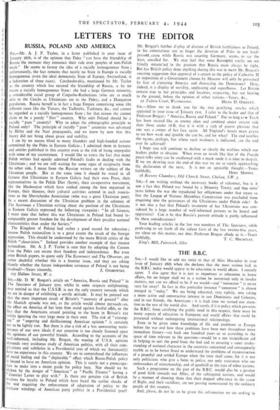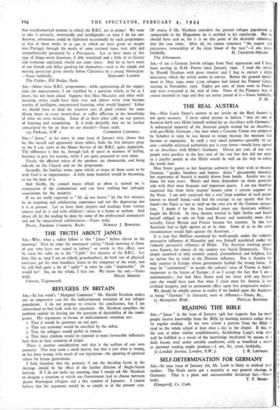THE B.B.C.
Sta,—I would like to add my voice to that of Miss Macaulay in your issue of January 28th when she declares that the most serious lack in the B.B.C. today would appear to be education in world affairs. I entirely agree. I also agree that it is just as important as education in home affairs, for no longer shall we as a nation be interested only in insular matters, nor can we afford to be if we would—and " tomorrow " is never very far away! In fact in this particular instance " tomorrow " is almost merged in "today." We are being educated, very rightly, into taking a more active and constructive interest in our Dominions and Colonies, and in our friends, the Americans ; it is high time we turned our attention to the rest of the world also. And surely, if it is policy which prevents the B.B.C. from satisfying the public need in this respect, there must be many aspects of education in European and world affairs that could be presented without endangering international relationships.
Even to be given some knowledge of life and problems in Europe before the war and how these problems have been met throughout more immediate history—say back one hundred years or so according to the space of time relevant to the question—would be a not insignificant aid in helping to sort the good from the bad and to securing a saner understanding of national character in the countries concerned and consequently enable us to be better fitted to understand the problems of reconstruction of a peaceful and settled Europe when the time shall come, for it is not only politicians who give a form to policy, not only statesmen who are ambassadors of statesmanship, and of goodwill in the eyes of other nations.
Such a programme on the part of the B.B.C. would also be a gesahre of good faith towards our Allies, of the subjugated nations, and would be a manner of showing them that their dogged adhe:ence to the cause of Right, and their sacrifices, are not passing unmeasured by the ordinary people of this country.
And, please, do not let us be given this information we are seeking in that overdramatised manner to which the B.B.C. are so prone! We want to take it seriously, interestedly and intelligently—at least I do for one. Anyway, seriousness could be lightened occasionally by such programmes as that of three weeks or so ago, in which we were given an insight into Portugal through the media of some national tunes very ably and sympathetically presented by a Portuguese. Let us have more o this type of thing—even literature, if ably translated and a little of its history and evolution explained, would not come amiss. And let us have more of our friends and Allies speaking for themselves—such as the simple and moving postscript given shortly before Christmas by a young Norwegian.
—Yours faithfully, MARGARET LANDON. The Poplars, Hill Bridge, Bude.
SIR,—About those B.B.C. programmes: while appreciating all the suggestions for improvement, I am troubled by a question which, so far as I know, has not been asked. Suppose that Miss Macaulay and other wellmeaning critics could have their way and almost every item become worthy of intelligent, concentrated listening, what would happen? Either we should have to lend the attentive ears of good citizens for some fifteen hours in every twenty-four, or suffer affliction in the knowledge of what we were missing. Some of us have other calls on our powers of listening and assimilating. Is it truly desirable that we be further conscripted by the air than we are already?—Yours truly,
125 Parkway, N.W. 1. CATHERINE CARSWELL.
SIR,—" Janus," in his notes in your issue of January 2ISI, shows that he, like myself and apparently many others, finds the five minutes prior to the 8 a.m. news in the Home Service of the B.B.C. quite deplorable. The difference is that he, through lack of space or niceness of feeling, hesitates to give his reasons, while I am quite prepared to state mine.
Firstly, the affected voices of the speakers are abominable, and bring ridicule on the Church and on the programme.
Secondly, the fathiliar terms upon which so many of them seem to be with God is an impertinence. A little more humility would be becoming, to say the least of it.
And thirdly, the canned music which so often is turned on is reminiscent of the crematorium and can have nothing but unhappy associations for the majority.
If we are really expected to "lift up our hearts" let the five minutes be an inspiring and exhilarating experience and not the depressing one it is at present. Let us have short prayers and readings from various sources and let it end with children's voices in a hymn or anthem. And above all, let the reading be done by some of the professional announcers and not by emasculated exhibitionists.—Yours truly,
Divots, Farnham Common, Bucks. NORMAN J. BOWATER.























 Previous page
Previous page